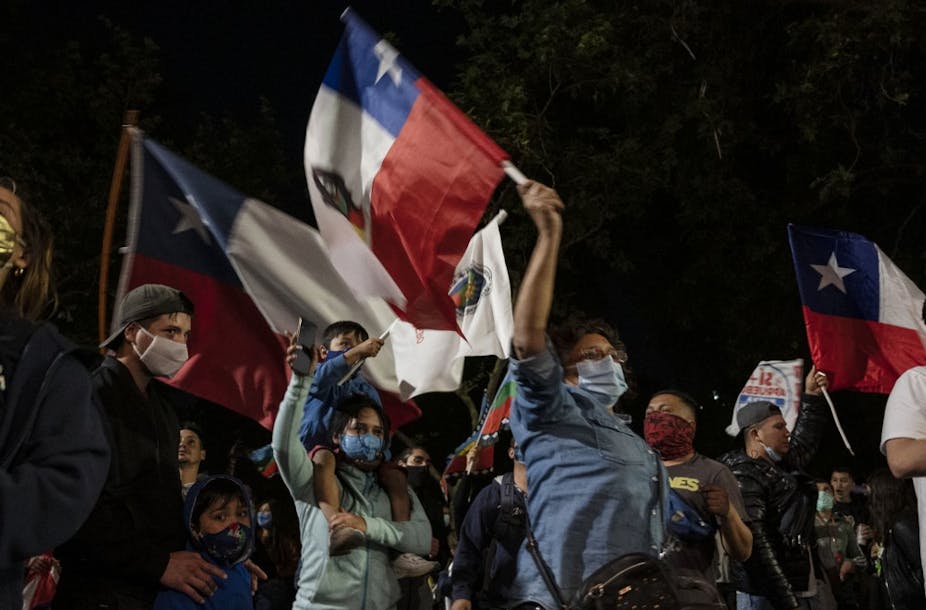On October 25, the Chilean people took part in a referendum on whether they wanted to adopt a new constitution. The result – 78% in favour – strongly signals their desire to leave behind the deeply neoliberal constitution imposed by Augusto Pinochet, which remains in place despite a number of reforms since 1989.
The referendum had its roots in a October 2019 decision by the government to increase metro fares by 3%. Protests quickly broke out and spread, and soon a nationwide resistance movement was born. Replacing the Pinochet-era constitution was one of the protesters’ key demands, and the referendum made that a real possibility. In the months ahead, the spotlight will be on the creation of the future constituent assembly, which for the first time in history will have guaranteed gender parity.
The process of writing a new constitution has the potential to mark a paradigm shift in how political power is exercised in Chile, but we should also be clear-headed about the on-the-ground complexities of constitution-making.
Constitution-making: a multifaceted process
Creating a new constitution tends to be seen as the epitome of popular sovereignty. The power to write a new constitution (in French, the pouvoir constituant) is enacted by representatives of the people who create the fundamental norms that frame the structure of the state. The idea that “the people” can write a constitution first appeared in the 18th century in the context of US independence. More than just a legal device used to limit the power of government, the US Constitution marked a deeper paradigmatic shift – that political authority is not derived from god, but from the people, as the first three words of its preamble, “We the People”, make explicit.
Against this shared imaginary underpinning how we commonly think about constitutions, the reality is complex and multifaceted. Far removed from the ideal of sovereign independence, the process of writing a new one has always been a transnational affair. Indeed, no constitution ever fully reflects the idealised vision of the pouvoir constituant. Historically, constitutions adopted during decolonisation were not drafted by “the people” but by metropolitan elites in big cities. As the British Empire was coming to an end, the constitutions of some of its former colonies were written by the colonial office, including that of Kenya.
Today the transnational dimension of new constitutions is less explicit. They are often developed by a body representing the people, as will be case in Chile, but international actors are integral parts of the process. Without infringing on the sovereign exercise of the national constituent assembly, organisations such as the United Nations, the International Institute for Democracy and Electoral Assistance (International IDEA) and the Venice Commission – are often present during the drafting stage to provide “comparative expertise”. Recent examples include Kenya (2010), Tunisia (2014) and Nepal (2015).
The inner workings of constitutional expertise
Constitutional expertise provided by international actors is formulated in technical terms and is based on the assumption that the right constitutional framework will accelerate the desired social change. Over the last decade, there have been a variety of “constitutional toolboxes” and guidebooks published, providing a blueprint to be used in processes of constitution-making, from the structure of the state to human rights.
This international expertise is framed in apolitical terms, treating deeply political issues as technical ones, but its empirical grounds are shaky. Little to no academic research exists to tell us the social outputs of a given institutional framework.
While constitution-making dates back several centuries, the process started to be formally studied only at the end of the Cold War. The discipline of comparative constitutional law is thus a relatively new scientific field. When the aim is to create a constitution that will democratise a country’s political system, as it is the case in Chile, we still do not know if a particular institutional framework leads to a desired social outcome. Anyone claiming otherwise does not have the data to back that up.
Though this is no fault of their own, what international actors can provide is limited, as they rely on a developing academic discipline with significant methodological limitations. The discipline of comparative constitutional law is not only young, but it’s also – with some exceptions – largely ethnocentric. For example, when assessing potential models to establish an independent constitutional institution that would combat corruption, experts tend to focus on a cases such as Germany, France, the United States and South Africa. At the same time, potentially valuable examples from non-western countries are discounted, thus reducing the horizon of possibilities.
Having the vision and political will to create a new constitutional framework that will fundamentally change how political power is exercised is obviously crucial. At the same time, constituent authorities should be aware of the inherent limitations of the comparative expertise provided by international actors. The opportunity that Chileans created for themselves should be celebrated as the success of hard-fought activism and social organising, even as hurdles await in the process itself. A new constitution can be a vessel to materialise the deeply felt desire for much-needed social change or can simply maintain the status quo with a slightly different face.


